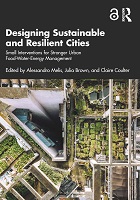Chapter 2 The urban living lab as an adaptive governance mechanism for the transdisciplinary Food-Water-Energy nexus
Proposal review
Lessons learned from six local contexts
| dc.contributor.author | Ghodsvali, Maryam | |
| dc.contributor.author | Dane, Gamze | |
| dc.contributor.author | de Vries, Bauke | |
| dc.date.accessioned | 2023-02-06T14:20:36Z | |
| dc.date.available | 2023-02-06T14:20:36Z | |
| dc.date.issued | 2023 | |
| dc.identifier.uri | https://library.oapen.org/handle/20.500.12657/61180 | |
| dc.description.abstract | Chapter 2: Engaging end-users in the Food-Water-Energy (FWE) nexus process has recently become a core concept, though the practice is often diverse across social contexts. Improving the governance mechanism of nexus complexity and facilitating more inclusive resource management requires adaptive user-centred approaches. An approach that currently shows promise is the urban living lab (ULL), in which urban communities, as the end-users of urban products and services, engage in a problem-solving process together with other stakeholders towards urban development. ULLs are a sort of joint urban governance that provide opportunities created by the integration of multiple disciplines to address FWE nexus challenges. However, there is a great need for the FWE nexus approach to clarify how a ULL can best be organised and integrated into the local governance structure. This research aims to help cities broaden their knowledge of engaging end-users in the FWE nexus processes through an examination of how the ULL approach has been operationalised in the governance structure of a number of nexus-emphasised cities. This is undertaken through the analysis of empirical evidence acquired from six local case studies. The chapter concludes that integrating the fields of participatory modelling methods, the ULL approach, and the FWE nexus will considerably advance cities’ capabilities in accomplishing the concept of transdisciplinarity for more sustainable environmental and natural resources management. | en_US |
| dc.language | English | en_US |
| dc.subject.classification | thema EDItEUR::A The Arts::AM Architecture::AMV Landscape architecture and design | en_US |
| dc.subject.classification | thema EDItEUR::A The Arts::AM Architecture::AMV Landscape architecture and design::AMVD City and town planning: architectural aspects | en_US |
| dc.subject.classification | thema EDItEUR::R Earth Sciences, Geography, Environment, Planning::RP Regional and area planning::RPC Urban and municipal planning and policy | en_US |
| dc.subject.classification | thema EDItEUR::R Earth Sciences, Geography, Environment, Planning::RN The environment::RND Environmental policy and protocols | en_US |
| dc.subject.classification | thema EDItEUR::J Society and Social Sciences::JB Society and culture: general::JBS Social groups, communities and identities::JBSD Urban communities | en_US |
| dc.subject.classification | thema EDItEUR::T Technology, Engineering, Agriculture, Industrial processes::TQ Environmental science, engineering and technology | en_US |
| dc.subject.other | urban living lab, urban governance, food-water-energy nexus, case studies, sustainability, natural resources management | en_US |
| dc.title | Chapter 2 The urban living lab as an adaptive governance mechanism for the transdisciplinary Food-Water-Energy nexus | en_US |
| dc.title.alternative | Lessons learned from six local contexts | en_US |
| dc.type | chapter | |
| oapen.identifier.doi | 10.4324/9781003112495-11 | en_US |
| oapen.relation.isPublishedBy | 7b3c7b10-5b1e-40b3-860e-c6dd5197f0bb | en_US |
| oapen.relation.isPartOfBook | 9624f806-1580-41d6-a186-92eca5bff9a0 | en_US |
| oapen.relation.isFundedBy | 06a86dbd-5d6d-4967-8268-abc02f677e72 | en_US |
| oapen.relation.isbn | 9780367631987 | en_US |
| oapen.relation.isbn | 9780367631970 | en_US |
| oapen.imprint | Routledge | en_US |
| oapen.pages | 33 | en_US |
| oapen.remark.public | Funder name: Eindhoven University of Technology - Sustainable Urbanisation Global Initiative (SUGI)/Food-Water-Energy Nexus | |
| peerreview.anonymity | Single-anonymised | |
| peerreview.id | bc80075c-96cc-4740-a9f3-a234bc2598f1 | |
| peerreview.open.review | No | |
| peerreview.publish.responsibility | Publisher | |
| peerreview.review.stage | Pre-publication | |
| peerreview.review.type | Proposal | |
| peerreview.reviewer.type | Internal editor | |
| peerreview.reviewer.type | External peer reviewer | |
| peerreview.title | Proposal review | |
| oapen.review.comments | Taylor & Francis open access titles are reviewed as a minimum at proposal stage by at least two external peer reviewers and an internal editor (additional reviews may be sought and additional content reviewed as required). |

